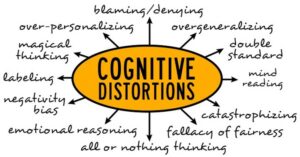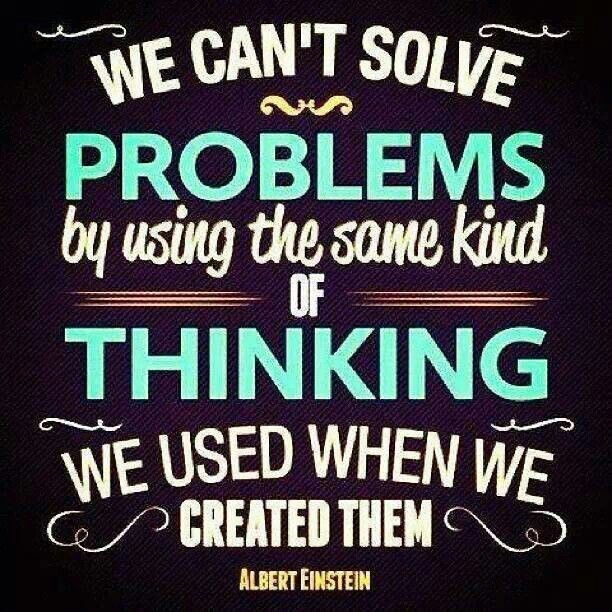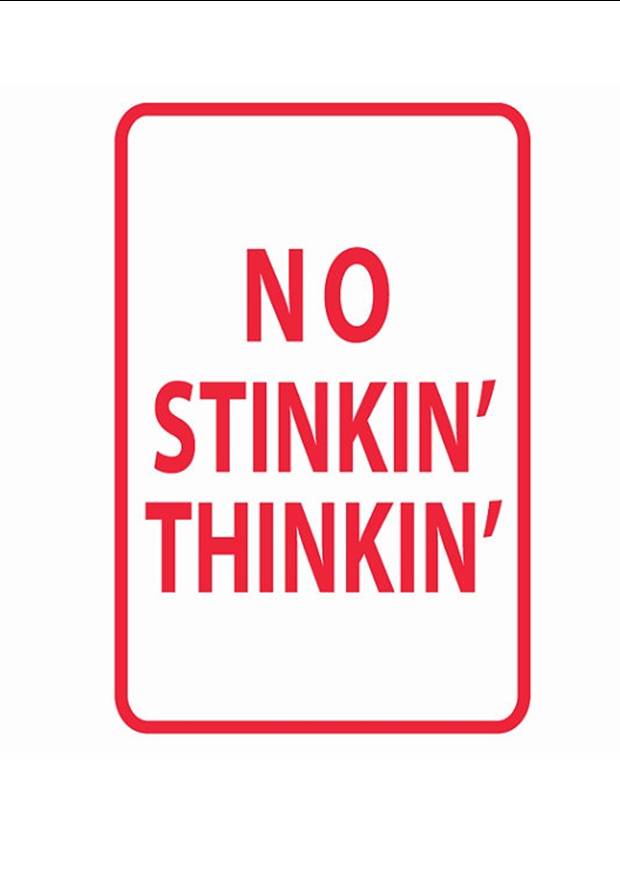Do you know someone who is always negative? Do you sometimes feel like your own thoughts are holding you back from success? If so, then you may be familiar with the term “stinking thinking.” This type of thinking can be harmful to our personal, professional, and social lives. In this blog post, we will explore what such thinking is, its causes, risk factors, and effects. We will also provide self-help tips and therapies that can help overcome this type of thinking.
Contents
Understanding Stinking Thinking

Stinking thinking is a type of negative thinking that can have harmful consequences. It is often characterized by pessimistic, self-defeating, and self-destructive thoughts.
People who engage in such thinking may believe that they are powerless to change their circumstances or that they do not deserve success. Thus, this type of thinking can lead to depression, anxiety, and other mental health issues.
Types of Stinking Thinking
Several different types of such thinking can lead to negative consequences. However, some common types include:
Catastrophizing
This type of thinking is characterized by magnifying the importance of negative events. People who catastrophize may believe that a small setback will lead to complete failure.
Example: “I can’t believe I got a C on my math test. I’m such a loser. I’m never going to graduate from college.”
Mind reading
This type of thinking is characterized by assuming that you know what others are thinking. People who mind read may believe that they can read other people’s thoughts and intentions.
Example: “She didn’t invite me to her party. She must not like me.”
Fortune telling
This type of thinking is characterized by negatively predicting the future. People who engage in fortune-telling may believe that they will always experience negative events.
Example: “I’m never going to get that job. I’m not good enough.”
Emotional reasoning
This type of thinking is characterized by basing your beliefs on your emotions. People who engage in emotional reasoning may believe that if they feel bad, then it must be true.
Example: “I feel like a failure, so I must be a failure.”
All-or-nothing thinking
This type of thinking is characterized by black-and-white thinking or viewing things in absolute terms. People who engage in all-or-nothing thinking may see themselves as either a success or a failure, with no middle ground.
Example: “I got a B on my math test. I’m such a failure.”
Overgeneralization
This type of thinking is characterized by making sweeping generalizations based on limited evidence. People who overgeneralize may see one negative event as an indication that all events will be negative.
Example: “I can’t believe he broke up with me. All men are jerks.”
Mental filter
This type of thinking is characterized by focusing on the negative aspects of a situation and ignoring the positive. People who engage in mental filtering may see only the bad in people and situations, and fail to appreciate the good.
Example: “I got an A on my math test, but I missed one question. I’m a failure.”
Discounting the positive
This type of thinking is characterized by dismissing positive events as being insignificant or unimportant. People who discount the positive may discount their own accomplishments and positive qualities.
Example: “I got promoted, but it’s only because my boss likes me.”
Victim mentality
This type of thinking is characterized by playing the victim role in every situation. People who have a victim mentality may believe that they are always powerless and that bad thing happens to them because of luck or other people’s actions.
Example: “My boss is always picking on me. It’s because I’m not good enough.”
Should statements
This type of thinking is characterized by using the word “should” to criticize yourself or others. People who use should statements may believe that they or others must meet unrealistic standards.
Example: “I should have gotten an A on my math test.”
Labeling and blaming
This type of thinking is characterized by taking the blame off yourself and putting it on others. People who engage in enabling and blaming may believe that they are not responsible for their own actions.
Example: “He’s lazy. He’ll never get a job.”
Personalization
This type of thinking is characterized by taking responsibility for events that are beyond your control. People who personalize may believe that they are responsible for everything that goes wrong in their lives.
Example: “I was late for work because I’m a terrible employee.”
Self-blame
This type of thinking is characterized by blaming yourself for negative events. People who engage in self-blame may believe that they are responsible for things that are outside of their control.
Example: “It’s my fault we got laid off. I should have worked harder.”
Negative self-talk
This type of thinking is characterized by talking to yourself negatively and critically. People who engage in negative self-talk may believe that they are not good enough or that they will never be successful.
Example: “I’m so stupid. I can’t do anything right.”
Causes of Stinking Thinking
There are several different causes of such thinking. Some common causes include:
Negative life experiences: People may engage in stinking thinking after experiencing a negative event or series of events.
Negative thinking patterns: People who tend to think negatively are more likely to engage in stinking thinking.
Poor coping skills: People may use stinking thinking as a way to cope with difficult emotions or situations.
Poor self-esteem: People who have low self-esteem are more likely to engage in stinking thinking. As they may believe that they are not good enough or that they will never be successful.
Risk Factors of Stinking Thinking
Several different factors can increase your risk of such thinking. However, some common risk factors include:
Stress: People who feel stress are more likely to engage in stinking thinking.
Anxiety: Anxious People are more likely to engage in stinking thinking.
Depression: People who are in depression are more likely to engage in stinking thinking.
Personality disorders: People with personality disorders are more likely to engage in stinking thinking.
Substance abuse: People who abuse drugs or alcohol are more likely to engage in stinking thinking.
Prone Personality Types
Certain personality types are more prone to such thinking. However, some common personality types that engage in stinking thinking include:
Victims: Victims are more likely to engage in stinking thinking. Because they often feel powerless and helpless in their lives.
Enablers: Enablers are more likely to engage in stinking thinking. Because they often enable others to take advantage of them.
People-pleasers: People-pleasers are more likely to engage in stinking thinking. Because they often put the needs of others before their own.
Perfectionists: Perfectionists are more likely to engage in stinking thinking. Because they tend to have high standards for themselves and others.
Control freaks: Control freaks are also more likely to engage in stinking thinking. Since they like to be in charge of everything and they don’t like surprises.
Over-achievers: Over-achievers are also more likely to engage in stinking thinking. As they often feel the need to be perfect and may put a lot of pressure on themselves.
Avoiders: Avoiders are people who often avoid difficult situations and emotions. Since they may use stinking thinking as a way to avoid dealing with their problems.
Evaluating Stinking Thinking

It is important to evaluate your own thinking patterns and determine if you are engaging in such thinking. However, some common signs of such thinking include:
Always see the negative: If you find yourself always seeing the negative side of things, then you may be engaging in stinking thinking.
Hard on yourself: If you are constantly putting yourself down and criticizing yourself, you may be engaging in stinking thinking.
Blame others: If you find that you are always blaming others for your problems, you may be engaging in stinking thinking.
Dwell on your mistakes: If you find yourself dwelling on your past mistakes, then you may be engaging in stinking thinking.
Have a hard time letting go of things: If you find it difficult to let go of things that have upset you, then you may be engaging in stinking thinking.
Impact of Stinking Thinking
Stinking thinking can harm every area of your life. However, some common effects of such thinking include:
Personal Life: People who engage in stinking thinking may have difficulty forming relationships and maintaining friendships. Since they may also experience low self-esteem and depression.
Professional Life: People who engage in stinking thinking may have a difficult time succeeding at work. As they may feel like they are not good enough or that they will never be successful.
Social Life: People who engage in stinking thinking may have a hard time making friends and interacting with others. In addition, they may also be more likely to experience stress and anxiety.
Overcoming Stinking Thinking
There are several different ways that you can overcome stinking thinking. However, some common methods include:
Self-help Tips
Several self-help tips can help you overcome such thinking. However, some common tips include:
- Avoid putting yourself down: Don’t criticize yourself or dwell on your mistakes.
- Focus on the positive: Make a list of all the things that are going well in your life and focus on those things.
- Set realistic goals: Don’t try to accomplish too much at once. Set realistic goals and take things one step at a time.
- Take care of yourself: Make sure to get enough sleep, eat healthy foods, and exercise regularly.
Self-help Tools
Several self-help tools can help you overcome such thinking. However, some common tools include:
Mindfulness: Mindfulness can help you focus on the present moment and let go of the past.
Journaling: Journaling can help you process your thoughts and feelings, and it can also be a helpful tool for self-reflection.
Positive affirmations: Positive affirmations are statements that you say to yourself to help you change your thinking.
Relaxation Techniques: Relaxation techniques such as yoga, meditation, and deep breathing can help you reduce stress and anxiety.
Self-help Techniques
Several self-help techniques can help you overcome such thinking. However, some common techniques include:
Cognitive Restructuring: Cognitive restructuring can help you change the way that you think about things.
Behavioral Activation: Behavioral activation can help you get out and do things that make you happy and boost your mood.
Problem-Solving: Problem-solving can help you tackle your problems head-on and find solutions.
Talking To Professional
If you find that you are struggling to overcome stinking thinking on your own, then it may be helpful to talk to a professional. As a therapist can help you identify the thoughts and beliefs that are causing such thinking. In addition, they can also help you learn new ways of thinking and coping with stress.
Therapies

Several different therapies can help you overcome such thinking. However, some common therapies include:
Cognitive-Behavioral Therapy: Cognitive-behavioral therapy can help you identify and change the thoughts and beliefs that are causing such thinking.
Dialectical Behavior Therapy: Dialectical behavior therapy can help you learn new ways of coping with stress and managing your emotions.
Interpersonal Therapy: Interpersonal therapy can help you improve your relationships and communication skills.
Case Study
Mary is a 38-year-old woman who has been struggling with stinking thinking for several years. Mary’s thinking began after she lost her job. Since then, Mary has been having a hard time finding another job.
In addition, she has also been having difficulty maintaining her relationships and interacting with others. Even though Mary has tried several different self-help techniques. But she hasn’t been able to overcome such thinking. Thus, she decides to talk to a therapist.
The therapist helps Mary identify the thoughts and beliefs that are causing her such thinking. Furthermore, the therapist also teaches Mary some new ways of coping with stress and managing her emotions. Subsequently, after a few months of therapy, Mary can overcome her stinking thinking and start living a more productive life.
Conclusion

Stinking thinking can be a difficult thing to overcome. However, several different methods can help you get on the right track. Thus, if you find that you are struggling to overcome such thinking on your own, then it may be helpful to talk to a professional.
Furthermore, if you or someone you know is struggling with such thinking, then don’t hesitate to reach out for help. There are several resources available to you. Remember, you are not alone in this. With the right help and support, you can overcome this thinking and start living a more productive life.
A Word From Therapy Mantra
Your mental health — Your psychological, emotional, and social well-being — has an impact on every aspect of your life. Positive mental health essentially allows you to effectively deal with life’s everyday challenges.
At TherapyMantra, we have a team of therapists who provide affordable online therapy to assist you with issues such as depression, anxiety, stress, workplace Issues, addiction, relationship, OCD, LGBTQ, and PTSD. You can book a free therapy or download our free Android or iOS app.


